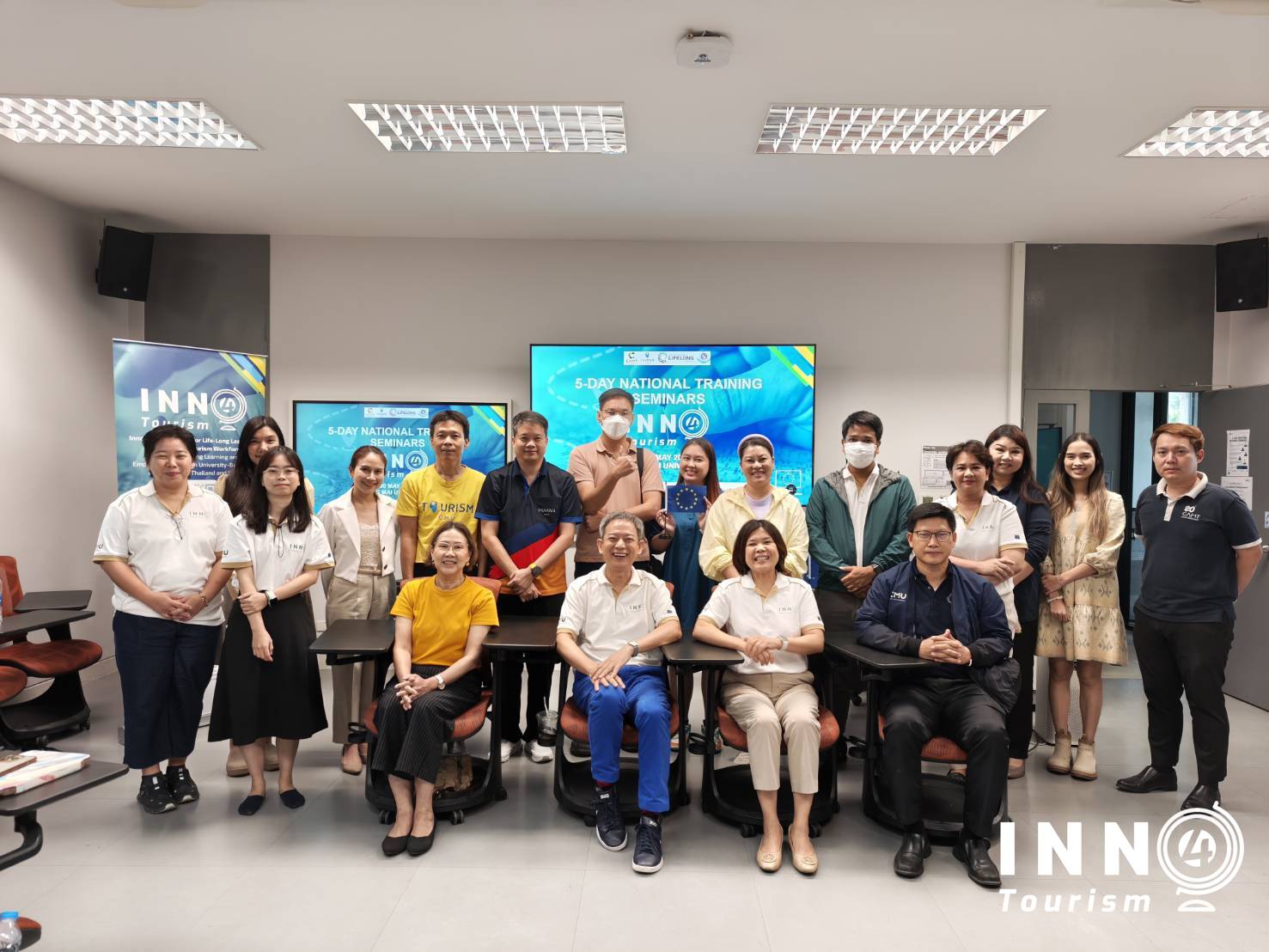
Published At: 05 Jun 2025

The INNO4Tourism project, funded by the European Union (Erasmus+), aims to elevate and develop the capacity of personnel in the sustainable tourism industry. 5-day national training seminar was organized from 26–30 May 2025 at Room ILC-C301, 3rd Floor, Building C, Innovation Learning Center, Chiang Mai University. Participants included representatives from various university departments and related project partners. The seminar was co-hosted by the College of Arts, Media and Technology, Chiang Mai University, the Department of Tourism, Faculty of Humanities, and the College of Lifelong Education, Chiang Mai University.
This event primarily aimed to transfer knowledge on modern sustainable tourism curricula as part of the Train-the-Trainer (ToT) process, enabling instructors and staff who completed the training to apply and further disseminate the knowledge effectively within their own institutions. The training covered sustainable tourism, entrepreneurship, tourism management, as well as digital, green, and soft skills essential for workforce development in the new era.
Daily Activities
Day 1 Seminar Topic: Problem-Based Project and Tourism Literacy for Sustainable Tourism Development
Speaker: Assistant Professor Dr. Yuthasak Chatkaewvananon, Head of the Department of Tourism, Faculty of Humanities
The session focused on presenting new conceptual frameworks in tourism, aiming to develop curricula aligned with the skills and needs of future learners, as well as strategic perspectives for sustainable tourism development.
Day 2 Seminar Topic: Community-Based Learning (CBL)
Speaker: Assistant Professor Dr. Pattaraporn Khuwuthyakorn, College of Arts, Media and Technology
This session introduced approaches to integrating education with community participation, where learners engage in real-world community practices to understand local problems, environments, cultures, and needs. It also emphasized academic and life skills development, as well as social responsibility, through case studies from the Faculty of Architecture and the “Green Tram Tour” activity, which featured guided tours of Chiang Mai’s green spaces by local environmental conservation groups.
Day 3 Seminar Topic: Approaches to Developing New Curricula under UBC and Reducing Course Redundancy with Artificial Intelligence Tools
Speaker: Assistant Professor Dr. Orawit Thinnukool, College of Arts, Media and Technology
This session emphasized analyzing needs for curriculum development using up-to-date data and modern tools, in line with University-Business Cooperation (UBC) mechanisms. The focus was on creating curricula that address real industry needs, reducing content redundancy with AI tools, and providing opportunities for participants to exchange experiences.
Day 4 Seminar Topic: Knowledge-Centric Learning Environment
Speaker: Assistant Professor Dr. Achara Khamaksorn, College of Arts, Media and Technology
The session highlighted designing physical learning environments and classroom atmospheres centered on knowledge, including seating arrangements, presentation spaces, and the use of media and equipment to foster deep learning. Instructors play the role of learning designers rather than just content deliverers. The workshop allowed participants to practice designing such environments.
Day 5 Seminar-Workshop: Fostering Collaborative Mindset towards Sustainable Development Goals with the SDGs 2030 Game
Speaker: Associate Professor Dr. Prathana Jaipong, Faculty of Science
The highlight of the final day was the use of the SDGs 2030 Game, a simulation game designed to help participants learn about and understand the 17 United Nations Sustainable Development Goals through real-world scenarios. Participants experienced and realized the importance of collaboration and balanced resource management, especially when reflecting on the contexts of sustainable tourism, digital skills, green skills, and soft skills needed for the modern workforce.
Throughout the five days, participants were given significant opportunities to learn from experts, exchange experiences with networks both inside and outside the university, and engage in practical activities in both theoretical and hands-on settings. They developed new concepts and skills applicable in their own institutions. Additionally, participants gained insights into curriculum development and refinement that meets current needs and were inspired to continue systematic knowledge advancement.
Moving forward, there will be an official launch of the courses co-developed by four leading universities under the INNO4Tourism project, to further disseminate and advance knowledge into future teaching and learning practices.